| Time |
Agenda |
|
10:30
–
10:45
|
|
|
10:30
–
10:45
|
|
|
10:47
–
10:57
|
|
|
|
Refugee hopes and ‘Diana's Legacy’
She made belief in herself and her abilities the best way to conquer the impossible. The Syrian refugee Maya Ghazal refused to be just a number on the list of the United Nations High Commissioner for Refugees and chose for herself the number one position on the list of global achievements as the first Syrian refugee to obtain a commercial pilot license in 2017 in the United Kingdom. She joins a tiny and exclusive minority of women pilots, a mere 4 to 6 percent, in the world.
When Maya was forced to leave her homeland, she faced numerous challenges and difficulties. However, after settling in the United Kingdom, she did not remain frustrated or helpless in the face of her new situation. Instead, she began moving towards achieving success, using her skills and abilities to learn the English language and work hard academically. She enrolled in aeronautical engineering and then obtained her pilot’s license in 2017. Later, she was appointed as a Goodwill Ambassador of the United Nations High Commissioner for Refugees in 2018.
Maya’s story and her struggle became a source of inspiration and encouragement for refugees worldwide. Through her simple and profound speeches via media and social networking sites, she reflected her thoughts and efforts to make the world a more just and humane place.
She is a leading advocate for the rights of refugees and has been supporting UNHCR since 2017. She received the Princess Diana Legacy Award in recognition of her work as an advocate for refugee rights.
In this interaction with Captain Maya Ghazal, we embark on a fascinating journey of success, drawing a map for attracting refugee talents for governments as we discuss the following:
- Maya Ghazal’s success story and how she turned challenges into opportunities
- The importance of promoting education in refugee communities and its impact on the future
- The role of the media and social networking sites in delivering pro-refugee messages
- The nature of the content that may touch the world’s communities to open the doors of success and achievements for refugees
- The impact of refugees with talents, competencies, and skills on host societies and social thought
|
|
|
Speakers:
-
Maya Ghazal
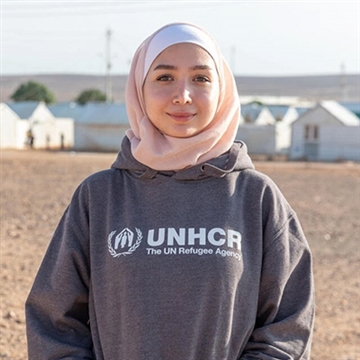 Goodwill Ambassador for UNHCR and the world's first female Syrian refugee to become a qualified pilot
Goodwill Ambassador for UNHCR and the world's first female Syrian refugee to become a qualified pilot
|
|
|
In partnership with:
United Nations High Commissioner for Refugees
|
|
10:58
–
11:08
|
|
|
|
The Emirati Genome Programme... A Journey to a Healthier Future
A decade has passed since the start of one of the world's largest genetics projects, the UAE Genome Programme (UAEGP). This massive national project was launched in 2014. Its goal is to build a genomics ecosystem to improve and transform healthcare services and to make life better for Emirati citizens. Gene mapping provides all the data necessary to help researchers, doctors, and scientists pinpoint the root causes of genetic diseases.
Governments across the world are on a quest to provide more accurate predictions when it comes to genetic and chronic diseases and to understand various kinds of genetic mutations. The goal is to be able to develop effective treatment and prevention strategies. These measures will greatly enhance public health and the quality of life and well-being of current and future generations.
Genomics programmes are powerful tools to improve healthcare services and to reduce the economic cost of diseases - there is a lot at stake here. Governments can play a strategic role by showing citizens and communities what benefits these health initiatives can bring. Should they have privacy-related concerns, they can also reassure them.
The UAE Genome is a prime example of the genetic revolution in the Gulf region. It is an important tool for researchers. The genome of more than 50,000 Emirati citizens has already been mapped. Over 200 new genetic mutations have been discovered - all of them are associated with genetic diseases.
The UAE Genome Programme developed new screening tests for a large number of genetic diseases. The data was collected and processed using the latest genome sequencing and AI technologies. Personal data has been encrypted and secured. The highest safety, security, and data privacy standards have been implemented. In this inspirational talk, we will discuss the importance of genetics and its impact on people's well-being. We will tackle the following themes:
- Implementing initiatives to communicate about a new genetic programme, which aims at collecting one million genetic samples
- Tips to easily recruit participants
- Keeping genetic data confidential and interpreting its most complex characteristics
- The importance of the programme to support research and put it into practice
- The programme's main goal is to deliver results, which can be put into practice and sent to relevant bodies; these results can eventually be used both locally and internationally.
|
|
|
Speaker:
-
Dr. Ahmed Al Awadhi
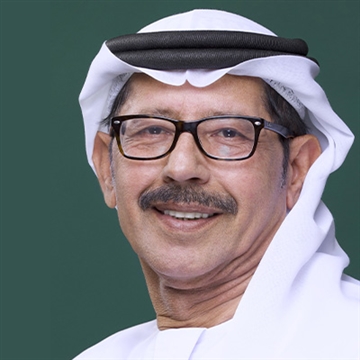 Senior Vice President and Director for Community Outreach, Emirati Genome Programme.
Senior Vice President and Director for Community Outreach, Emirati Genome Programme.
|
|
11:09
–
11:29
|
|
|
|
Zachery Dereniowski: The Image of Humanity Reflected in Emotional Connections
It may seem strange to many: what does it mean to roam the streets, get to know others, and offer them unconditional attention and affection? This is exactly what Zachery Dereniowski, a student at the College of Medicine in Australia with over 11 million social media followers, has done. He believes that the mental health of societies can be achieved through emotional connection, which in turn can restore both moral and material prosperity to individuals.
Zach walks around with a sign that says "compassion is free," trying to get close to people and find those who are most in need of emotional support. He listens to their problems and then puts them through a financial giving test, rewarding them for giving him a quarter with a cash amount that could help solve their mental health problems.
Through his spirit of caring for others, Zach found and helped the less fortunate. Based on their human stories, he became a content creator on social media. From his intellectual philosophy, he built communication messages that he wanted to plant in global communities: "We resist weakness with the ability to communicate, which leads to empowerment. When we are weak together, we can communicate, and when we can communicate, we can enable others to feel comfortable." This inspiring speech delves into Zach’s vision of human emotional communication and its impact on the development of societies.
- How did Zachary Dereniowski’s story become a positive model for the intersection of human giving and emotional connection?
- Why did Zach seek to enhance human and emotional connection in overcoming the individual’s social weakness?
- What is the importance of Zach’s social media content in deepening social thought that challenges difficulties with cohesion?
- To what extent did Zach’s content creation contribute to achieving the step of establishing a non-profit organisation to collect donations?
- How did Zach build emotional connection opportunities to overcome the feeling of loss and set life and development goals?
- What is the importance of individuals having the skills to speak openly and confidently about themselves to overcome challenges?
|
|
|
Speaker
|
|
11:35
–
12:15
|
|
|
|
When "Adventure" Turns into a Soft Power
"Adventure" has become a core element of potentially rewarding returns on investment for high-risk ventures in today's economy, particularly for small and emerging projects. Despite their uncertain and innovative nature, resilient governments incorporate these projects into their economic activities, believing that the "adventure economy" is a significant developmental opportunity and an effective bridge for building strong relationships based on trust and improving adaptability to changes. Additionally, it utilises "soft power" to improve quality of life and well-being.
Studies suggest that the growing demand for innovation, technology, and adventure-driven tourism projects, particularly with government support for entrepreneurship, will propel the adventure economy's significant growth in the coming years. However, the adventure economy is characterised by rapid change, where technology and market trends evolve constantly, instilling fear of volatility and high levels of uncertainty due to the difficulty in predicting outcomes.
Given this context, resilient governments must consider communication with investors and the community as a bridge to overcome the fog of fear and uncertainty through messages that build trust, establish fruitful cooperation, and encourage talents to enter it. Additionally, raising public awareness that the adventure economy is a promising field with immense developmental potential is crucial. Therefore, this session discusses the following topics:
- Building a complementary relationship between the "venture economy" and "soft power" by enhancing the reputation of governments that support innovation.
- The impact of country characteristics on the trends of the "venture economy" and "adventure tourism."
- The importance of countries relying on adventure-based education to enable the development of forward-looking fields.
- Laying the groundwork for creating an interactive environment that encourages the exchange of ideas and experiences among entrepreneurs and investors.
- Mechanisms to convince various community actors, including universities, financial institutions, and major companies, to support the adventure economy.
|
|
|
Moderator:
|
|
|
Speakers:
|
|
12:17
–
12:57
|
|
|
|
Why Resilient Governments are Building Protective Shields with Artificial Intelligence
Imagine this: They manipulate your voice and appearance to spread lies, instantly tarnishing your reputation and destroying any hope you might have for the future. This is causing alarm bells to ring all over the world. Unfortunately, we, as governments and societies, are living with the frightening reality of "deepfake" technology, where AI-generated content precisely impersonates anyone, posing a significant threat to credibility and public discourse among humans.
Unfortunately, the total number of deepfake incidents has increased by 550% between 2019 and 2023. Experts observe its use in financial fraud, disseminating false information, and other activities, which jeopardise individual safety, societal foundations, and values. It undermines trust, manipulates public emotions, and has a substantial potential to incite chaos and violence on a large scale.
In this reality, the rapid advancement of deepfake technology poses a challenge for smart technologies built to detect it, creating a continuous loop, a scenario similar to a battle between the "good" and "evil" forces of artificial intelligence. This epic struggle sees artificial intelligence fighting itself, while governments find themselves in an ongoing confrontation with AI as they work to improve their resilience and protect society from harm. This session, therefore, discusses the following topics:
- What are the appropriate steps that governments should take to raise awareness about deepfake?
- The role of resilient governments in mitigating the risks of deepfake and protecting citizens from its effects.
- Mechanisms for resilient governments to shape public opinion in the face of AI-generated content in communication messages.
- The importance of adopting educational initiatives that arm communities with algorithm and computer programming knowledge to counter the malicious use of artificial intelligence.
- How to work on obliging developers to implement technical measures against the misuse of deepfake technology.
|
|
|
Moderator:
|
|
|
Speakers:
-
Hector Monsegur
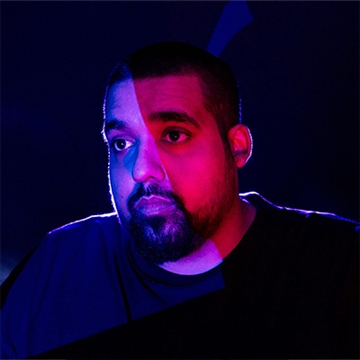 Founder (of a cybersecurity startup), Security Researcher and Director of Research
Founder (of a cybersecurity startup), Security Researcher and Director of Research
-
Nader Al Gazal
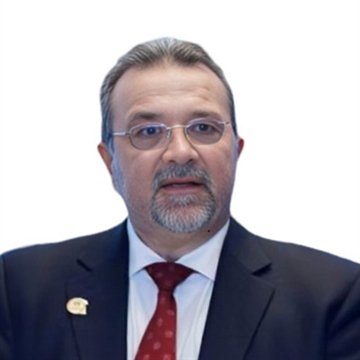 Academic and Expert in AI and Digital Transformation
Academic and Expert in AI and Digital Transformation
-
Alan Smithson
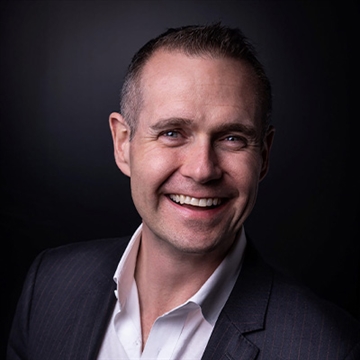 Co-Founder of Metaverse (Facebook)
Co-Founder of Metaverse (Facebook)
-
Dr. Inhyok Cha
 Professor at Gwangju Institute for Science and Technology and Deputy President for Global Cooperation (South Korea)
Professor at Gwangju Institute for Science and Technology and Deputy President for Global Cooperation (South Korea)
|
|
|
|
|
|
Platform manager:
-
Alia Al-Souqi
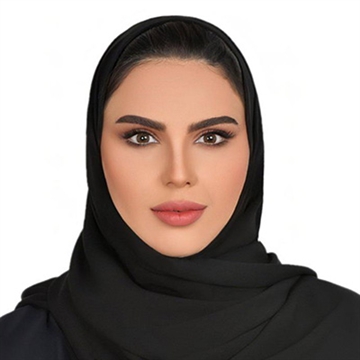 Official Spokesperson Programme Graduate - Sharjah Commerce and Tourism Development Authority
Official Spokesperson Programme Graduate - Sharjah Commerce and Tourism Development Authority
|
|
10:30
–
11:00
|
Session: Perception of the youth on openness to cultures
We live in an era characterised by tremendous openness to other cultures as a natural result of technological development and ease of communication.
While this openness offers huge opportunities for young people to expand their horizons and unleash their potential, they are regularly warned that this embracing of openness must be done cautiously and consciously. Increasingly, the challenge facing young people today is balancing openness to the world and preserving their cultural identity.
Young people face an intellectual dilemma as they become aware of the importance of openness and expanding their horizons in areas such as education, development, innovation, creativity, tolerance and acquiring communication skills.
On the other hand, there are fears that difficulties will arise in adapting to other cultures and that openness will lead to a loss of one’s identity, conflict of values, and the erosion of local culture.
In the context of this conflict of ideas, social media platforms have become a discussion forum between supporters of absolute openness, those who reject it, and those calling for balance.
The session discusses the pros and cons of openness to cultures with social media influencers. It provides an opportunity to understand various divergent views and gauge public opinion on the matter.
Focusses:
- Discussing the negatives and positives of openness.
- The impact of youth on topics that serve the field of communication and interaction in society and the family.
- The role of the family, society, and educational institutions in consciously embracing openness to cultures in a conscious manner.
- Critical learning is important in developing the capabilities and skills of youth for dialogue and effective communication with their communities as well as other communities.
- Stimulating the role of youth in positive and purposeful movements in society.
- Investing in openness to other cultures in positive ways consistent with our culture in order to serve the individual and society.
|
|
|
Speakers:
|
|
|
Moderator:
-
Maryam Al-Sharaf
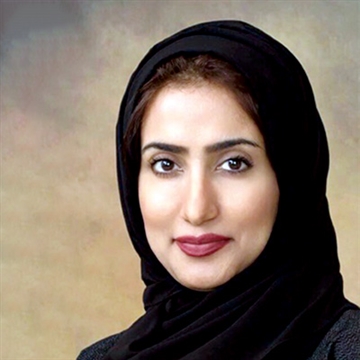 Head of the Media and Technical Affairs Department, Sharjah Supreme Council for Family Affairs
Head of the Media and Technical Affairs Department, Sharjah Supreme Council for Family Affairs
|
|
|
Organizer:
Family Development Department and Branches
|
|
11:02
–
11:32
|
Session: The role of communication in strengthening national industry
Effective communication plays a fundamental role in building bridges of trust and understanding between social media users and the industry. This contributes to achieving sustainable development and advancing the national economy.
As consumers or social media users become aware of all the details of the product and sometimes market it indirectly through various platforms, how has this change impacted the national industry?
The United Arab Emirates was keen to inject young Emirati energies into the industrial sector to advance the economy and reach Emiratization goals, and to use social media to exchange experiences and knowledge and benefit from their success stories in enhancing the positive image of this sector. In addition to highlighting the international factories present in the country and their impact on the economy.
We may be facing challenges in entering these digital platforms. It has become essential today to handle them intelligently, to continue the path of economic development and to paint a positive image of the national economy. At the International Government Communication Forum, we will delve into understanding the importance of effective communication in the industrial sector and how we can prepare for these future challenges.
Focusses:
- The importance of good and effective communication in developing relationships and enhancing success at work, and the importance of building partnerships and initiatives to support the industrial sector.
- The challenges and opportunities facing the industry amid the influx of social media information.
- The role of communication and promotion for global and local factories in the industrial area.
- Attracting foreign investments through communication and relationship development.
- The impact of communication on promoting national products.
- The importance of promoting innovation and advanced technology in the industry.
- The challenges and opportunities facing the industry amid the influx of social media information.
- The importance of communication and enhancing cooperation between the public and private sectors.
|
|
|
Speakers:
-
HE Ammar Al Alili
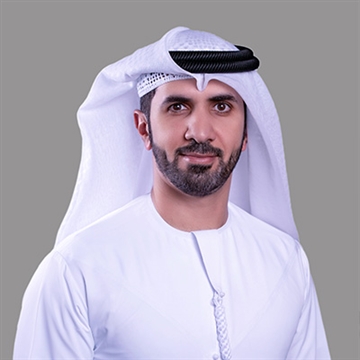 Director General of the Umm Al Quwain Chamber, UAE
Director General of the Umm Al Quwain Chamber, UAE
-
Salama Al-Awadhi
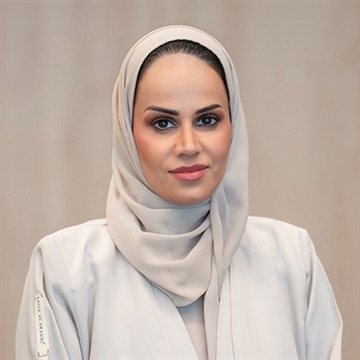 Director of the Value-Added Department at the Ministry of Industry and Advanced Technology, UAE
Director of the Value-Added Department at the Ministry of Industry and Advanced Technology, UAE
|
|
|
Moderator:
|
|
|
Organizer:
Umm Al Quwain Chamber of Commerce and Industry
|
|
11:35
–
12:10
|
Discussion session: Marketing incentives to attract investors to sustainability sectors
Effective communication and marketing messages are the key to attracting investors. Government agencies and private companies in the Emirate of Sharjah are now working to broadcast communication messages through various interactive channels that directly touch the interests of potential investors and provide them with a clear and distinct value for investment.
The most successful marketing messages are those that are convincing and influential, and capture the available opportunities and potential risks.
The session discusses investment opportunities and sectors in the Emirate, with primary focus being on sustainability, agriculture, and food security. It aims to highlight the capabilities and opportunities offered by Sharjah and the support provided by government agencies to young people to start their projects in these sectors.
It discusses the current efforts and projects offered by each government agency participating in the session, in the sustainability, agriculture, and livestock sectors.
The session also seeks to develop visions on how to support and encourage young people to delve into various sectors and diversify the projects offered by young entrepreneurs, in addition to spreading awareness about current projects and opportunities in the Emirate of Sharjah.
Focuses:
- Communication and marketing messages and their impact on attracting investors.
- The role of the Emirate of Sharjah in the food security, agriculture, and sustainability sectors.
- Investment opportunities offered by the Emirate in the sustainability, food security, and agriculture sectors.
- How can government communication play a role in encouraging young people to explore opportunities in the sustainability and food security sector, including agriculture and livestock?
- Investment challenges in the food security and sustainability sectors.
- How can government agencies support startups to provide innovative solutions to address challenges in the agriculture, livestock, and sustainability sectors?
|
|
|
Speakers:
|
|
|
Moderator:
|
|
|
Organizer:
Sharjah Investment and Development Authority (Shurooq)
|
|
12:35
–
13:05
|
Session: Innovations in Government Communication and Stimulating Global Competitiveness
Governments around the world are constantly evolving communication strategies to meet the demands of an increasingly interconnected and competitive global landscape. Effective communication has become essential to governments' success in the twenty-first century. Innovative communication strategies enable governments to disseminate information, interact with citizens, build confidence, and promote national goals. This session explores how governments can leverage innovative communication technologies to enhance global competitiveness and achieve their objectives.
The session brings together experts from the Apolitical Foundation, the leading platform for enhancing communication between governments and improving government performance, the United Nations Institute for Training and Research (UNITAR), the United Nations Department of Economic and Social Affairs (UNDESA), and the CSO Network. These experts will discuss the role of innovation in government communication and its methods. Topics include government strategies for attracting and retaining talent, as well as the impact of communication innovation on improving transparency, trust, sustainable development, and international cooperation.
Focusses:
- Why do some countries excel at government communication while others face significant challenges?
- How do governments adopt new communication technologies and methodologies?
- How can innovative communication strategies improve a country's ability to attract, host, and develop talent?
- To what extent do flexible immigration policies, special visa programmes, and other incentives affect talent attraction?
- What is the importance of adopting communication strategies that clearly convey information and data related to government initiatives, and what impact does this have on transparency?
- What are the best practices to ensure government communication is clear, honest, and accessible?
- What are the best ways to integrate education into government communication strategies to develop local capacities?
- How can governments use communication to promote and achieve the Sustainable Development Goals?
- What are the benefits of effective communication strategies for persuading governments and investors to advance national interests?
- What are the most successful techniques for international cooperation and communication, and what is the importance of utilising global platforms to build countries’ reputations?
|
|
|
Moderator:
|
|
|
Speakers:
|
|
12:10
–
14:10
|
Inspiring Speeches: Sharjah Government Communication Award… Messages of Excellence and Brilliance
The forming of international strategic alliances this year as part of the 11th edition of the Sharjah Government Communication Award (SGCA) reflects the ceaseless efforts to enhance the role of the award in developing the global communication system.
These alliances have resulted in extensive exposure to pioneering experiences in communication for the SGCA nominees by each of the Award partners, namely ‘Apolitical,’ the leading global platform for enhancing communication between governments, the CEO Sustainability Network (CSO Network), the United Nations Department of Economic and Social Affairs (UN DESA), and the United Nations Institute for Training and Research (UNITAR).
The IGCF offers a great platform to share experiences and success stories in effective communication management and stories of excellence and brilliance by way of inspirational speeches by a select group of nominees this year to win the Partners' Awards in 4 categories:
- The Best Innovation in Government Communication award
- The Best Innovative and Flexible Communication Initiatives award
- The Best Communication Practices for Dealing with Developmental Developments award
- The Best Communication Practices for Dealing with Developmental Developments award
Best Communication Practice Award for Dealing with Developmental Developments
- PepsiCo: Green Accelerators 12:10-12:20
- Al Futtaim Group: Sustainability at the Heart of Al Futtaim’s Strategy 1:21-1:31
Al-Futtaim Group has placed sustainability at the heart of its growth strategy, affirming its role as a responsible and forward-thinking leader. Over the course of three months, the group led a public awareness campaign focusing on sustainability and green mobility, in preparation for the UAE hosting COP28. It presented an initiative aimed at making a significant societal impact to enhance the future of sustainability.
- Emirates Nature-WWF 1:32-1:42
For over two decades, Emirates Nature-WWF (World Wildlife Fund) has been a prominent and active partner of WWF in the field of environmental conservation in the Middle East and North Africa. It is a local think tank for environmental conservation, working to empower civil society, governments, and businesses to support the sustainability agenda in the UAE and achieve large-scale transformational impact for the benefit of humanity and the planet.
Innovative and Flexible Government Communication Initiatives Award
- “For a Drop of Water” Awareness Campaign 1:43-1:53
This campaign, launched by the Ministry of Water and Irrigation and the General Water Authority in Jordan in March 2024, aims to enhance the efficiency of water use in homes, promote rationalisation and influence consumption behaviours, while emphasising the importance of rationalising and preserving water consumption, especially through partnerships with the private sector, and raising awareness of the economic cost to the country and its people.
- Tuvalu’s Project as the “World’s First Digital Nation” 1:54-2:04
Tuvalu’s Minister of Justice, Communications and Foreign Affairs, Simon Coffey, unveiled a radical plan at COP27, announcing that Tuvalu will become the world’s first “digital nation” to protect the island nation’s identity and rights.
The idea is to recreate Tuvalu in the virtual world, preserving its heritage and government services even after the physical land disappears. Leveraging the media engagement and strong advertising of COP27, the campaign sparked urgent conversations on climate action and climate change mitigation, reaching around 2.1 billion people.
Best Innovation in Government Communication Award
- ElderTech to Adapt Seniors to Digital Transformation in Singapore
How can we ensure that seniors do not fall behind in technology? In the face of artificial intelligence and new technology, Singapore’s Open Government Products (OGP) conducted interviews with seniors and social workers and found that technology can make life more difficult, as seniors are not familiar with digital design patterns, making access to public services such as healthcare and pensions more difficult. So the ElderTech platform was designed to help them stay connected to government services and adapt to digital transformation.
- ‘Dumb Ways to Die’ Campaign
The Melbourne Metro safety campaign, ‘Dumb Ways to Die,’ has become the most widely shared public service campaign in the world. The launch of an animated music video on YouTube has become a global success, having gone viral on social media. It has been downloaded more than 130 million times and received more than 4 billion views worldwide. The campaign has contributed to a 20% reduction in accidents compared to the annual average.
- Citifeed App: Eyes and Ears on Government Performance
Kaduna State in northern Nigeria has launched a local mobile app called Citifeed to use the public to monitor infrastructure projects and government performance, making the government more responsive to citizen feedback.
The app, part of the Eyes and Ears public expenditure system, allows users to identify nearby public infrastructure projects via GPS coordinates, upload photos and notes on project progress and the quality of hospitals, schools, and community services.
How has this app promoted transparency, accountability, and civic engagement?
|
|
|
Inspirational Speeches Director:
-
Alaa Saif AlAtr
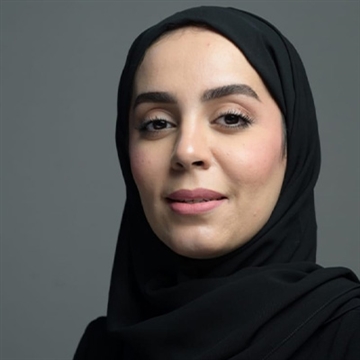 Official Spokesperson Programme Graduate, Sharjah City for Humanitarian Services
Official Spokesperson Programme Graduate, Sharjah City for Humanitarian Services
|
|
|
Speakers:
-
Becky Briggs York
 External Communications Officer, Africa, Middle East and South Asia (AMESA), Corporate Affairs, PepsiCo
External Communications Officer, Africa, Middle East and South Asia (AMESA), Corporate Affairs, PepsiCo
-
Natalie Hatoum
 Communication Manager at PepsiCo
Communication Manager at PepsiCo
-
Katib Belkhodja
 Director of Customer Centralization - COE CX
Director of Customer Centralization - COE CX
-
Lavin Chanani
 Head of Marketing and Digital Engagement at Emirates Nature-WWF.
Head of Marketing and Digital Engagement at Emirates Nature-WWF.
-
HE Mukhtar Ahmed
 Commissioner, Planning and Budget Commission, Government of Nigeria
Commissioner, Planning and Budget Commission, Government of Nigeria
|
|
09:00
–
17:00
|
|
|
|
Influencer Dynamics: Mastering Public Communication in the Digital Age
This three-day programme, in partnership with Forbes Middle East and GOVCAMPUS, aims to equip government officials with the necessary skills effectively to utilise influencer marketing in public communication. Participants will gain comprehensive insights into influencer strategies, engagement techniques, legal and ethical considerations, and campaign development. The course includes interactive lectures, group discussions, hands-on exercises, and a guest speaker session with prominent influencers.
This programme targets government officials, civil servants, and communication professionals. This workshop provides the tools to enhance public communication in the digital era. Upon completion of this programme, participants will possess the skills to create impactful influencer marketing campaigns, evaluate their effectiveness, and devise strategies that enhance governmental messages.
Focusses:
- Identify and define influencer engagement and reach in ways that best benefit the national communications strategy
- Understand how influencers tell stories that resonate with their audiences, and how their techniques and tools differ from government communications
- Improve transparency and increase community and citizen trust by engaging in influencer collaborations.
|
|
|
Trainers:
-
Khuloud Al Omian
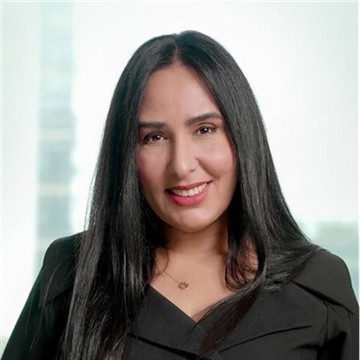 CEO and Editor in Chief, Forbes Middle East
CEO and Editor in Chief, Forbes Middle East
-
Moon Baz
 Creator Partnerships Lead, Africa, Middle East, Turkey, META
Creator Partnerships Lead, Africa, Middle East, Turkey, META
-
Omar Qirem
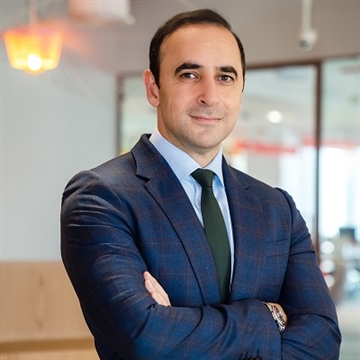 CEO of Edelman Middle East and Vice Chairman of PRCA MENA
CEO of Edelman Middle East and Vice Chairman of PRCA MENA
-
Reem AlMusabbeh
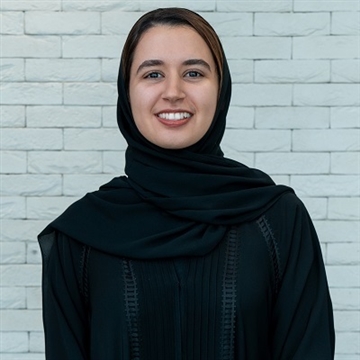 Founder and CEO, Retech & Esaal and Cofounder and COO of Unipreneur
Founder and CEO, Retech & Esaal and Cofounder and COO of Unipreneur
-
Ahmed Haffar
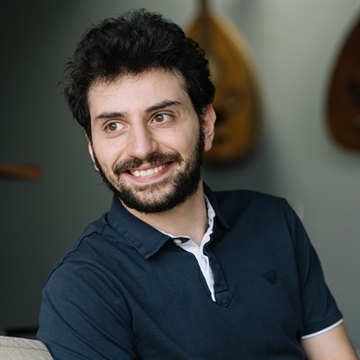 Voice of Dubai, Managing Partner, Mindloop Studios
Voice of Dubai, Managing Partner, Mindloop Studios
-
Ramia Farrage
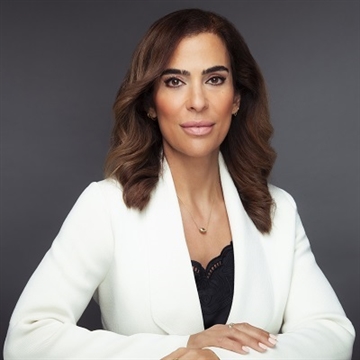 Senior Presenter and Producer, Forbes Middle East
Senior Presenter and Producer, Forbes Middle East
-
Nancy Bahmad
 Senior Presenter, Forbes Middle East
Senior Presenter, Forbes Middle East
-
Patrick Sawaya
 Photographer & Founder, Patrick Sawaya Photography
Photographer & Founder, Patrick Sawaya Photography
-
Sara Al Refai
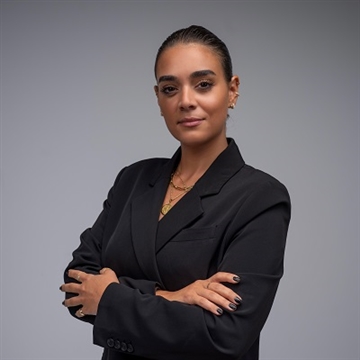 Managing Director, edraakmedia
Managing Director, edraakmedia
-
Chiara Seidender
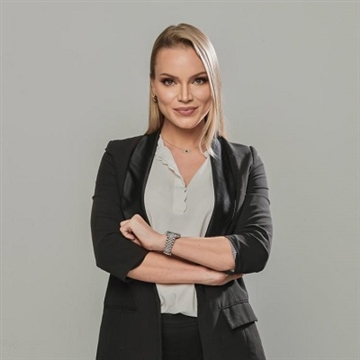 Entrepreneur / Longevity/Nutrition/Wellness / TEDx Speaker
Entrepreneur / Longevity/Nutrition/Wellness / TEDx Speaker
-
Cedric Hadad
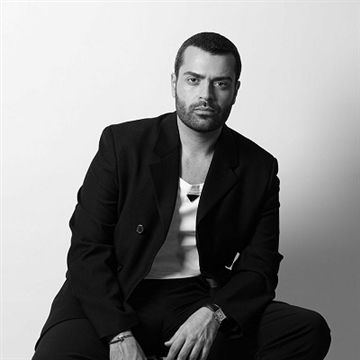 Celebrity Stylist, TV Host, Fashion Luxury Trainer
Celebrity Stylist, TV Host, Fashion Luxury Trainer
|
|
|
Organaizer:
Forbes Middle East and GOVCAMPUS
|
|
09:00
–
17:30
|
|
|
|
Trainers:
|
|
|
Organizer:
The United Nations Institute for Training and Research (UNITAR)
|
|
|
Government Marketing and Nation Branding Program
The "Innovative Programme for Government Marketing and Nation Branding," delivered by the United Nations Institute for Training and Research (UNITAR), is a comprehensive two-day programme designed to enhance government marketing and nation branding strategies.
In today’s interconnected and competitive world, effective government marketing is essential for achieving policy goals, managing service perceptions, projecting soft power, and enhancing a nation's brand image. This course covers critical aspects, including policy execution through marketing, brand management for services, harnessing soft power, and developing a comprehensive nation branding strategy.
Participants will learn to communicate and execute policies effectively, manage brand identity, leverage cultural and diplomatic assets for global influence, and create a positive national image that attracts investment, tourism, and partnerships. Participants will equip themselves with tools to enhance communication with citizens, improve service delivery, and project a strong, positive national brand internationally by the end of the programme.
Focusses:
- Harness soft power and cultural diplomacy in an increasingly interconnected world.
- Create a national narrative to improve citizen’s national pride and create a heightened sense of belonging.
- Understand which storylines and marketing tools resonate best with national and international audiences to deploy them appropriately.
|
|
|
|
|
10:30
–
11:15
|
Session: Responsible Use of AI in Media
The media sector is undergoing a massive transformation due to rapid developments in artificial intelligence (AI) technologies. These advancements offer significant potential to enhance operational efficiency, improve content quality, and expand audience reach. However, the use of AI in media also presents challenges that need to be addressed, requiring responsible and ethical use of these technologies while considering their risks.
This session provides a platform to discuss these critical issues and propose concrete solutions to ensure a successful and responsible media journey in the age of artificial intelligence.
Focusses:
- The role of artificial intelligence in improving media efficiency.
- Ethical and professional challenges associated with using artificial intelligence in the media.
- Strategies to ensure the responsible use of artificial intelligence in Arab media.
|
|
|
Speakers:
-
Prof Dr Hisham Abbas Zakaria
 Professor of Media and Dean of the College of Communication at Al Qasimia University, Sharjah
Professor of Media and Dean of the College of Communication at Al Qasimia University, Sharjah
-
Dr Bassam Al-Makkawi
 Head of the Mass Communication Department at the College of Communication at Al Qasimia University, Sharjah
Head of the Mass Communication Department at the College of Communication at Al Qasimia University, Sharjah
|
|
|
Moderator:
|
|
|
Organizer:
|
|
11:20
–
12:05
|
Session: The Role of Willpower and Strategic Management in Successful Trading
In the world of trading, filled with promising opportunities and possibilities, individuals embark on various paths, requiring interactive discussion, thorough research, and considerable patience. Trading is one of the most widespread and complex financial activities globally, demanding a deep understanding of markets, well-considered strategies, and swift, practical decision-making.
Alia Al Ketbi, an Emirati entrepreneur, recognised the vast potential in the field of trading and entered this world, starting from the basics and progressing to advanced strategies. She overcame the challenges traders face and developed the skills to navigate them successfully.
With determination and effective management, she launched an educational initiative under the slogan "We rise by raising others," offering everything needed in terms of education and experience to embark on a successful trading journey and create new income streams. The project provides top-tier educational and training materials, the latest trading techniques, and resources to help traders—whether professionals or beginners—find what suits them best.
In this session with Alia Al Ketbi, we explore essential trading skills and decision-making strategies that lead to success, benefiting individuals, communities, and governments alike. This aligns with government directives encouraging individuals to actively participate in shaping future decisions.
Focuses:
- Building a Strong Reputation: A Success Story in the Distance Education Sector
- Key Trading Skills and the Crucial Role of Communication
- The Importance of Self-Discipline and Avoiding Common Emotional Mistakes
- Managing Losses and Profits: The Role of Self-Confidence and Optimism in Achieving Goals
- Foundations for Promoting a Culture of Innovation and Continuous Learning within Teams
- Dealing with Pressures and Challenges: Strategies for Making Informed Decisions
- Latest Developments in Trading and the Impact of Technology on the Industry
|
|
|
Moderate:
-
Zayed Al Zaabi
 Graduate of the Job Shadowing Programme, Sharjah Government Media Bureau (SGMB)
Graduate of the Job Shadowing Programme, Sharjah Government Media Bureau (SGMB)
|
|
|
Speaker:
-
Alia Al Ketbi
 CEO of Entwa Remote Learning, a leading UAE trading company
CEO of Entwa Remote Learning, a leading UAE trading company
|
|
|
Organizer:
Training Department - SGMB
|
|
12:10
–
12:55
|
Session: The role of effective communication in enriching nations’ talent wealth
The United Arab Emirates has embraced the approach of investing in education and knowledge to lead in the ongoing global race for innovation and development, and for the well-being of societies and growth of future generations. Inspired by this belief, the UAE’s strategic vision has focused on creating and attracting talent to move forward at a steady pace toward success and lead in attaining sustainable development goals.
Besides its efforts to attract and enrich talents in various sectors, it was necessary to reconsider the methods of activating the role of media and communication in this, more than ever before, as the development challenges are enormous and constant, and the skills race is at its fiercest. Therefore, it was important to create a communication and media discourse as it helps attract the right talent to the country.
This strategy has necessitated greater reliance on multi-skilled media professionals and content makers, who, in addition to traditional writing expertise, possess photography, editing, and other skills that suit the requirements of new media and artificial intelligence journalism.
So we are talking about nations attracting talent as a societal wealth by employing the skills and talents of those in the media and communication profession, in order to build fruitful communication with young people and those with competencies in various fields, to understand their views and to establish innovative foundations and mechanisms for attracting ideal talent.
Focuses:
- The implications of communication skills in attracting talents to achieve sustainable development of nations
- The role of comprehensive journalism and digital media in attracting talent.
- The nature of the required media and communication discourse that reflects governments’ adoption of talent
- The impact of government communication on the private sector encouraging it to help create talent
|
|
|
Speakers:
|
|
|
Organaizer:
Emirates Journalist Association
|
|
12:55
–
13:40
|
Session: The Impact of Artificial Intelligence (AI) on the Legal Field
There is no doubt that artificial intelligence is one of the most significant challenges facing humanity in recent times. The remarkable development in technology, particularly in artificial intelligence methods, has raised concerns about its use and advancement. There have been increasing calls to raise awareness of the harms associated with this tremendous development in artificial intelligence, which, like any other invention, has two sides. The first side encompasses the benefits for humanity, such as saving effort and time in various aspects of life. However, the other side includes negative impacts, such as replacing certain jobs and businesses with artificial intelligence programmes, as well as various other harms and effects across different sectors.
The legal sector and the advocacy field are certainly not exempted from these changes, as many international legal institutions have adopted artificial intelligence programmes in their work, among which programmes to measure customer satisfaction or limit information and data, review customer accounts, and organise work in the law firm, in addition to many different systems that rely on artificial intelligence, including algorithms and equations that enable these programmes to read countless documents, organise them, and arrange them, which can eliminate some of the work associated with the legal profession. Therefore, in this panel, we discuss the developments and challenges facing lawyers in the future.
Focusses:
- Communication channels in the legal field between the past and the present.
- The impact of employing artificial intelligence in law firms and the legal sector.
- Legal awareness of the advantages and disadvantages of using artificial intelligence.
- Anticipating the future of the legal profession and methods of communication and interaction with clients.
|
|
|
Speakers:
|
|
|
Moderator:
|
|
|
Organizer:
Emirates Association for Lawyers and Legal
|
|
13:50
–
14:35
|
Activity: Challenge of Building Cultural Communication Strategies
Cultural diversity is a reality of our contemporary world. The societal structure of most countries around the world today constitutes individuals with diverse cultural backgrounds. Therefore, cultural communication has become an essential skill that can be learned and developed to succeed in today's world, and to build strong relationships with people from different cultures to create a more tolerant and understanding world.
The effectiveness of cultural exchange and promoting a culture of tolerance requires building communication and cultural strategies. This is essential to support understanding of diverse ideas and views and develop intercultural government communication skills through a competitive spirit between multinational teams working to develop an innovative strategy for cultural government communication between their country and other nations, characterised by flexibility and employing various media and communication means.
The contest involves the stimulation of creative thinking and innovation in intercultural government communication skills by supporting cooperation and teamwork between students from different cultural backgrounds to arrive at the best cultural communication strategies. The contest is judged by an expert jury. The most distinguished teams will receive prizes and awards at the end of the challenge.
Focuses:
- Explaining the role of government communication in promoting cultural understanding
- Discussing successful government initiatives in cultural communication
- Identifying personal experiences in interacting with diverse cultures and discussing how to improve these experiences
- Supporting communication and understanding methods among members of teams composed of individuals from multicultural backgrounds
- Opening horizons of thinking to develop government communication strategies that promote understanding with a youthful spirit
Participants:
Audience
|
|
|
Moderator:
|
|
|
Organizer:
Training Department - SGMB
|
|
14:40
–
15:10
|
Dialogue Session: The Imprint of Artificial Intelligence on Administrative and Educational Communication
Artificial Intelligence (AI) is a powerful tool that is revolutionising administrative and educational communication. However, rules and guidelines must be established for its use and caution must be exercised in its use in view of its potentially negative consequences.
Despite the benefits of artificial intelligence, it is important to maintain human interaction in administrative and educational processes to ensure effective communication and human relations.
In the education sector, administrative and educational communication is vital for growth and development, and its tools have been evolving in line with the technological acceleration witnessed by the world. The use of modern technology in this sector has developed and transformed administrative and educational processes.
Artificial intelligence has come to play a significant role in human resources management, internal and external communication, process automation, and data analysis for decision-making. It also helps in designing customised study plans based on the needs of each student and providing feedback to develop learners' skills and other employment methods.
Despite these positive aspects of using artificial intelligence, it raises issues about privacy and data protection in educational and administrative environments. It also requires significant investments in technology and training.
This dialogue session sheds light on the impact of artificial intelligence on management and education.
Focuses:
- What should the nature of administrative tasks be in the era of artificial intelligence?
- What are the most important areas where artificial intelligence can be employed in management?
- To what extent does the effectiveness of these applications reflect on the quality of services and operations in them?
- What are the key areas where emotional artificial intelligence can be used in academic education and the importance of linking it to artificial intelligence?
- What is the relationship between artificial intelligence and sustainability?
- How do technological development and intelligence achieve a system of sustainability in the lives of young people?
- Your advice to young people to maintain the national vision and achieve global prospects in the use of artificial intelligence.
|
|
|
Speaker
|
|
|
Organizer:
Training Department - SGMB
|
|
09:00
–
11:00
|
The University Challenge is organised annually by the United Arab Emirates University in cooperation with the Sharjah Government Communication Award and is hosted by the International Government Communication Forum. Each year, the competition focuses on a specific topic, drawing participation from university students both domestically and internationally. The competition aims to amplify the role of university students in offering innovative solutions to challenges in government communication.
The University Challenge 2024 offers students an opportunity to compete in "content creation," emphasising its vital role in displaying institutional contributions toward strategic goals, ambitions, and business development. Content creators leverage their creativity and energy to produce valuable and engaging content, paving their way into the business world. Participants are encouraged to develop a platform, innovation, or idea that utilises government communication mechanisms, programmes, and channels. By embracing the opportunities and tackling the challenges of "content creation," they can effectively benefit from these resources.
Objectives of the Challenge:
- Encourage creative thinking among university students to develop sustainable solutions to challenges in various aspects of government communication.
- Motivate universities both within and outside the country to contribute creative ideas and innovative projects in the field of government communication.
- Promote effective collaboration between national and international universities.
- Enhance the capabilities of university students by refining their skills and preparing them more comprehensively for community service and contribution.
- Cultivate innovative thinking among university students, encouraging them to utilise modern technologies and smart applications to devise alternative and sustainable solutions to contemporary challenges.
|
|
|
Challenge Director:
|
|
10:00
–
15:00
|
|
|
|
Researchers Platform
A qualitative initiative that was launched by the International Government Communication Centre during the eighth session of the IGCF in 2019 with the aim of providing knowledge-related content and a database for all matters related to government communication such as research, studies, books, references and global best practices. It seeks to become an essential reference for workers, researchers and scholars in this field as well as being a forum for exchanging knowledge and research to ensure the development of government communication domestically, regionally and internationally.
The "Researchers" platform includes several academic and knowledge-related activities, as well as a presentation of the International Government Communication Centre's latest publications and a discussion of books on government communication issues or topics related to the IGCF's themes.
Platform Goals:
- Provide an open forum for students at communication and media faculties (in state universities) to discuss their master’s theses and research-based and applied graduation projects in various areas of government communication.
- Shine a light on graduation projects by the students of the professional diploma for government communication.
- Invite a group of academics and government communication experts in local and federal organisations and bodies to discuss the various facets of government communication, and to present their institutional experiences in this area through the submitted research papers, studies and working papers.
|
|
|
Programme of the Platform:
|
|
10:00
–
10:40
|
A Book Review:
AI Technologies and the Quality of the Arabic Content. Creating an Automated Professional Content - Dr. Mohamed Abdulzaher and Dr. Sheren Mousa - Members of the Academic Committee of Government Communication
The role of government communication in spreading a culture of tolerance and rejecting hatred - Dr. Rahima Aissani, member of the academic committee for government communications
|
|
10:40
–
11:40
|
Graduation Projects (Universities Students):
Role of Social Networks to Improve Satisfaction and Performance of University Students - Jawaher Al Dhefairi, Al Ain University
Enhancing Social Participation of People of Determination in the United Arab Emirates - Producing a video for the social participation of the deaf - Yara Mohammad Ead Al Bashir, Adnan Mohamed Alhamami, Umm Al Quwain University
An educational awareness campaign entitled "Doiyatna" - Mariam Salim Alnaqbi & Amna Yaqoub Al Rayssi, University of Sharjah (Kalba)
|
|
11:40
–
13:00
|
Research Papers (Academic Institutions):
The role of social media in shaping the mental image and enhancing awareness of sustainable development issues - Dr. Mohamed Mallek and Dr. Abbas Ramdani, University Of Khorfakkan
The role of Government communication in supporting cultural inheritance and the extent of its reflection on the Emirati identity - Dr. Rabab Abd Elmonam and Dr. Samar Abdulhalim, City University College of Ajman
The role of digital security media programmes in promoting awareness and supporting positive values in society - Dr. Medhat Aboubakr, Sharjah Police Academy
|
|
13:40
–
14:20
|
PhD and Master Theses :
Spreading Rumours and Fake News on Social Media and Their Impact on Users’ Trust - Dr. Nahla Zakaria Mohamed Tawfik, Cairo University
Arabic Films Content: An Analytical Study from the Perspective of Value Determinism in Media - Abdullah Kassem Abdullah, University of Sharjah
|
|
14:20
–
15:00
|
Research Initiatives:
Sharjah Police Research Centre initiatives to support scientific research - Abdalla Mohamed Al Melaih, Head of Scientific Research Department, Sharjah Police Headquarters
"Trends" initiatives to support scientific research - Sultan Majed Al Ali, Deputy Head of Dubai Office and Head of the Global Barometer and Research, TRENDS Research & Advisory
|
|
|
Moderator:
|
|
|
|
|
12:00
–
13:00
|
Session: The future of media in the era of flexible governments ... challenges and opportunities
In light of the need to adopt flexible government mechanisms that seek to enhance transparency and interaction with the public, the role of the media becomes more important in conveying information, shaping public opinion, and promoting civic participation.
Between the nature of the challenges facing the world and the opportunities that may arise from them, this discussion session explores the future of media in the era of flexible governments, with a focus on the nature of the challenges facing media institutions in light of the rapid changes, and their impact on them.
The session also opens the way for research into the horizons of available opportunities based on employing modern technology to enhance the role of the media in building more transparent and aware societies.
Focusses:
- Challenges facing the media in the era of flexible governments.
- The impact of digital transformation on traditional media business models.
- Methods to confront the spread of fake news and misleading information.
- Challenges of accessing government information and enhancing transparency.
- Opportunities available to the media in the era of flexible governments.
- The importance of enhancing civic participation through interactive media platforms.
- The role of the media in enhancing government transparency and accountability.
- The impact of building partnerships between media institutions, governments, and civil society on enhancing awareness of public issues.
ٍSpeakers:
|
|
|
Moderator:
-
Mariam AlJenaibi
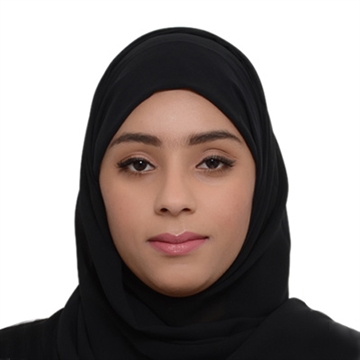 Innovation and Future Foresight Center officer at Agriculture and Livestock Department.
Innovation and Future Foresight Center officer at Agriculture and Livestock Department.
|
|
14:00
–
15:00
|
Session: Governmental Resilience and Adaptability in Facing Modern Challenges
The challenges facing governments in our contemporary world are new and increasingly complex. From natural disasters to economic crises to the attempt to create a new world order, all of these issues urge governments to exercise sufficient flexibility to immediately adapt to challenges, recover quickly from their effects, and even benefit from them as opportunities for growth and development. This approach ensures their stability and the well-being of their citizens.
This session reviews the results of a research study on the flexibility and adaptability of governments in the face of modern challenges. It focuses on analyzing the case of an East Asian country, considered a role model for flexibility, adaptation, and activating constructive communication in this regard.
Focusses:
- Exploring the factors that contribute to enhancing government flexibility and the role of communication in this.
- Learning about the typical foundations of effective leadership.
- Identifying strong institutional structures.
- Pointing out the importance of using advanced technology to enhance flexibility in facing challenges.
Podcast:
Podcast is an interactive platform that is aimed at conducting interviews with dignitaries, thought leaders and speakers headlining the IGCF. The Studio offers an ideal platform for in-depth dialogues and fruitful discussions on the key issues addressed by the forum, enhancing communication and interaction with the public and expanding the scope of participation in its activities.
The Podcast Studio is part of the Trends Centre pavilion at the IGCF and broadcasts all IGCF sessions and workshops online across all Trends Centre platforms. It also provides interpreters to cover various sessions of the IGCF in multiple languages. The Trends Centre employs modern media and communication technologies such as research robot, hologram technology and other interactive platforms, to report workshops and presentations live for remote attendees.
|
|
|
|
|
09:00
–
10:45
|
Workshop: Korean Heritage in Sharjah
When Sharjah hosted the first regional headquarters in the UAE and the Middle East for the King Sejong Institute for Korean Language Learning this year, it reflected the emirate’s efforts through the Department of Government Relations to strengthen cultural ties with world civilisations. It also embodied the department’s commitment to deepening the roots of international cooperation by communicating with international cultural institutions and bodies to establish Sharjah’s position as a cultural centre and a leading meeting place for world cultures.
At the International Government Communication Forum, the department is working to open channels of communication with Korean culture, with a one-day course in which attendees have an enjoyable experience in learning Korean calligraphy. The KCC Centre also provides them with the opportunity to learn about and try on traditional Korean costumes. Every cultural heritage is a link to communicate with other cultures.
Trainer:
|
|
|
Organizer:
|
|
12:40
–
13:40
|
Session: Cultural Connections: Strengthening International Bonds
Cross-cultural communication establishes a strong foundation for enduring and stable relationships between nations, serving as a necessary means to elevate local cultures and nurture them within the broader context of global civilisation. Moreover, it plays an undeniable role in paving the way for socio-political relations rooted in sustainable collaboration. Culture, in its own right, is a vital sector within a nation’s economic ecosystems and plays an essential role in supporting the GDP, diversifying employment opportunities, enhancing innovation, and investing in talents, making it a major component for the development of creative industries.
The cultural and creative sector is one of the most notable development drivers worldwide. According to UNESCO, culture accounts for more than 48,000,000 jobs globally, half of which are held by women, representing 6.2 percent of the overall existing employment and 3.1 percent of the global GDP. It is also the sector that recruits and provides opportunities for the largest number of youth under the age of 30.
In this respect, the Department of Government Relations in Sharjah remains committed to boosting cross-cultural communication and forging sustainable relations. It has facilitated collaboration by establishing branches of renowned international cultural centres in Sharjah, such as the Alliance Française and the King Sejong Institute Centre (KSIC). These centres serve as a meeting point where Sharjah's culture converges with global cultures, fostering mutual understanding and exchange.
Focusses:
- Exploring Sharjah’s perspective on cultural communication and its global alignment.
- Examining the potential of international cultural centres to foster cultural exchange and understanding.
- Highlighting how cross-cultural communication can enhance the agility and resilience of corporate and government entities.
- The positive impact, economic and developmental benefits of effective cultural communication.
- Anticipating the future role of cultural communication and strategies for building resilient frameworks.
Speakers:
|
|
|
Moderator:
|
|
|
Organizer:
Department of Government Relations in Sharjah
|
|
11:50
–
12:35
|
Session: Arab Parliament for the Child: An Innovative Communication Platform
The Arab Parliament for the Child was launched in Sharjah, making significant strides in the Arab region towards investing in the capabilities and visions of new generations, and paving the way for them to become leaders and decision makers in the future. The parliament headquarters was inaugurated by His Highness Sheikh Dr Sultan bin Mohammed Al Qasimi, Member of the Supreme Council and Ruler of Sharjah, in the presence of the Secretary-General of the Arab League. The move translated Sharjah’s vision towards providing an empowering environment that supports children and reinforces their roles in achieving the ambitions of their countries.
The parliament offered a new communication experience to Arab children, through fostering a robust network of Arab Members of Parliaments (MPs) in all countries across the Arab world. This made it one of the exceptional examples that is worth studying in terms of harnessing new and innovative communication strategies and mechanisms that ensures children are represented not only in Arab capitals and big cities, but also in provinces, rural and remote areas.
Focusses:
- Showcasing the experience of the Arab Parliament for the Child.
- Communication role in sharing knowledge and expertise between Arab children.
- Training package at the Arab Parliament for the Child.
- Parliamentary sessions.
- Parliamentary feedback.
Speakers:
|
|
|
Moderator:
|
|
|
Organizer:
Arab Parliament for the Child
|
|
10:46
–
11:46
|
Session: French Words of Arabic Origin – Civilisational Interaction
The French language contains numerous words that originate from Arabic, a result of historical interaction between Arab and Western civilisations. This linguistic exchange reflects the richness of the Arabic language and its influence on other languages. Discover in this session the world of linguistic exchange between civilisations and its impact on communication between peoples.
|
|
|
Organizer:
|
|
|
|
|
09:00
–
10:00
|
Inspirational Talk: Deraya Talk
The "Deraya Speakers" platform has emerged as one of the leading platforms for qualifying professional speakers and enhancing their skills according to the highest international standards. It offers training programmes designed to develop the performance of individuals, enabling them to speak professionally in the media within their respective fields and specialties. In response to the growing challenges in the modern communication landscape, the platform fosters creativity and innovation, equipping speakers to convey their messages effectively through innovative methods.
The International Government Communication Forum provides a valuable opportunity for graduates of the Deraya platform to share their ideas and opinions by delivering inspiring speeches on personal development and leadership skills within their areas of expertise. They also discuss their experiences as independent speakers and the impact of public speaking on their professional lives. Each speaker presents their experience in a brief session lasting between 3 to 5 minutes. The speeches cover a wide range of topics, including science, arts, business, sociology, and various other scientific specialties.
|
|
10:00
–
10:40
|
Session: Independent Speaker: How Can They Drive Innovation and Support Economic Growth?
Several government agencies worldwide have increasingly recognised the value of independent speaker programmes due to their significant impact on overall economic development. These programmes promote innovation, stimulate economic activity, enhance the flexible labour market, and foster an entrepreneurial culture and technological innovation. The future speaker relies on key elements such as presence, body language, and a rich linguistic repertoire to effectively convey their message to the target audience.
This session discusses the crucial role that independent speakers play in enhancing and developing the economy. It will focus on how independent speakers contribute to raising economic awareness and guiding public opinion towards sound economic decisions. The session will also discuss how to build a professional image for the independent speaker to enhance trust between the public and economic institutions.
Focusses:
- The role of the independent speaker in promoting innovation and creativity.
- The impact of the independent speaker in creating new job opportunities.
- The independent speaker as a factor in maintaining investment and economic growth.
- Challenges and opportunities facing the independent speaker in the modern economy.
Speakers:
|
|
|
Moderator:
-
Hind Khlaifat
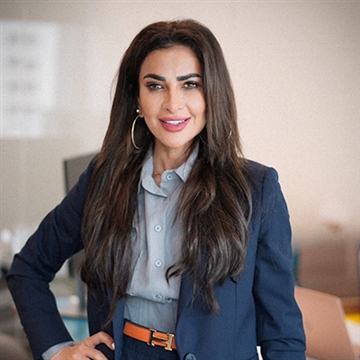 Media professional and General Manager of Deraya for speakers
Media professional and General Manager of Deraya for speakers
|
|
11:00
–
11:40
|
Session: Linguistic Richness in Government Communication Flexibility
Linguistic richness and communication flexibility are essential skills in developing effective communication. When combined, they empower individuals to express their thoughts and feelings clearly and accurately, influence and persuade others, navigate various social and professional situations efficiently, and build strong, lasting relationships.
This session addresses the vital role that linguistic richness plays in enhancing the flexibility of government communication. The aim is to demonstrate how effective use of language can achieve clear and transparent communication between the government and the public. The session will focus on the importance of linguistic diversity in delivering government messages in a manner that suits different target audiences and its impact on building trust and enhancing community engagement.
Focusses:
- The impact of linguistic richness on the effectiveness of government communication.
- Improving public understanding and response through linguistic diversity.
- Considering cultural and linguistic diversity in government communication.
- Using technology to enhance linguistic richness in government communication.
Speakers:
|
|
|
Moderator:
|
|
12:00
–
12:40
|
Session: The Impact of Artificial Intelligence on Individual and Institutional Communication Skills
Artificial intelligence has dramatically transformed the way we interact and communicate with each other and with organisations. It has also influenced how we improve and develop communication skills at both the individual and organisational levels. This session will explore how modern technologies, supported by artificial intelligence, can be leveraged to enhance communication effectiveness and simplify communication processes within and outside organisations.
Focusses:
- Improving communication effectiveness through AI tools.
- Personalising messages and enhancing communication through emotional intelligence.
- Challenges and ethics in using AI in communication systems.
- Training and skill development to keep pace with AI advancements.
Speakers:
|
|
|
Moderator:
|
|
13:00
–
13:40
|
Session: The Synergy between Independent Speakers and Soft Power
The independent speaker influences public opinion through their experience, knowledge, strong personality, and ability to communicate effectively. This enables them to be persuasive, attracting and understanding others, and positioning themselves as representatives of cultural diplomacy. As disseminators of values and principles, they promote a positive image of the state. In this way, the independent speaker can serve as a powerful tool for enhancing a state's soft power.
Focusses:
- The role of the independent speaker in enhancing the state's soft power.
- The independent speaker as a tool for cultural and civilisational communication.
- Effective strategies for supporting and developing independent speakers.
- Challenges facing the independent speaker in the soft power system.
Speakers:
|
|
|
Moderator:
|
|
14:00
–
14:40
|
Workshop: Deraya Toastmasters Club
The Toastmaster workshop is a communication and leadership development programme that enables participants to practise leadership skills such as listening, critical thinking, providing feedback, and motivation, all of which contribute to the effectiveness and flexibility of communication. This programme also helps to enhance the skills of orators and speakers, even in impromptu situations.
The Deraya Toastmasters Club workshop at the International Government Communication Forum in Sharjah will include a variety of activities and discussions focused on improving communication and public speaking skills for government speakers. Practical examples and strategies will be presented to improve overall performance in government communication. Participants will gain new insights and develop their skills through direct interaction with experts and participation in practical activities.
Focusses:
- The importance of effective government communication.
- Public speaking skills.
- Building a positive image for the government speaker.
- Interaction with the audience and managing questions.
Trainer:
|
|
15:00
–
16:00
|
Session: One-on-One Sessions
The Deraya platform offers visitors to the International Government Communication Forum the opportunity to participate in individual sessions to assess and develop their communication and leadership skills. These sessions provide training in speaking, public speaking, expressing opinions, critical thinking, and providing feedback, enabling participants to communicate effectively and constructively in both social and professional environments. The platform features short, individual training sessions with professional trainers, during which participants' performances are evaluated, with a focus on enhancing their strengths and addressing any weaknesses.
Speakers:
|
|
|
Speeches that Changed the World:
Visitors to the International Government Communication Forum will have the opportunity to view inspiring global speeches by influencers, leaders, and experts on a large screen.
|
|
|
Organizer:
"Deraya Speakers" platform
|
|
09:00
–
15:00
|
A diverse podcast that sheds light on the success, distinction, and brilliance of the "Smiling Emirate" locally, regionally, and globally. It narrates the details of the making of the present and the future through a proud history, arts, and culture that enlighten minds, and a social thought that combines authenticity and modernity, for a bright future founded on science and innovation. In "Sharjah Voice," we live with pioneers, innovators, and thinkers, distinctive stories, and a source of inspiration for all. At the International Government Communication Forum, the podcast takes you on a journey of acquiring new knowledge that you experience with the forum's guests by raising topics that touch on our daily lives and the development of our society and our world, starting from communication as an important part of connecting with societies and governments.
On each journey, the podcast explores scientific experiments to showcase the progress and innovations achieved by the Emirate of Sharjah. The topics address the economic dimensions of flexible governments and their impact on the development of multiple sectors, including space, the silver economy, and the adventure economy's impact on tourism. It also delves into the depths of information and data wars and attracting talent. Furthermore, it analyses with the guests our reality with artificial intelligence and the implications of future trends, in addition to exploring the new wave of personal interaction.
|
|
|
|
|
10:00
–
10:30
|
Discussion Session: Effective Steps for District Councils in Promoting Family Cohesion”
In light of ongoing social developments, the workshop “Effective Steps for District Councils in Promoting Family Cohesion” is a vital occasion to explore and discuss the role of suburban councils in supporting family cohesion as a basic nucleus in improving social communication, thereby positively reflecting on the effective interaction between local authorities and the community.
This workshop represents a unique space to analyse how to enhance communication and family cohesion in society, based on the experience of the Emirate of Sharjah as an exemplary model. The workshop also reviews successful projects and initiatives aimed at enhancing family cohesion, with a focus on methods and tools that enable local government agencies to build strong bridges with the local community.
Focusses:
- Discuss the role of communication channels in enhancing family cohesion.
- Review successful projects and initiatives in the field.
- Enhance awareness of the importance of enhancing family bonds and its role in community development.
Speaker:
|
|
|
Moderator:
|
|
11:00
–
12:00
|
Discussion Session: What are the Benefits of Flexible Government in Student Parents’ Councils?
Opening with the session titled 'What are the Benefits of Flexible Government in Student Parents’ Councils?', discussions delve into the rapid developments in flexible governments and the use of technology in communication and interaction processes. The session reviews the latest innovations in this field. It also provides an opportunity to exchange experiences on how to use technology to strengthen the relationship between parents’ councils and the government. Effective communication between government institutions and society is essential to enhancing transparency and building trust, especially regarding education and student care.
This session aims to shed light on how to use modern technologies in flexible government to improve communication with parents, contributing to strengthening the partnership between schools and families to comprehensively support students. The session highlights the latest innovations in flexible government, such as electronic systems for school management, smart applications for parent communication, and the use of data and analytics to improve educational services and meet students’ needs more effectively. It also facilitates the exchange of experiences on best practices and challenges in this field, striving to achieve a fruitful educational experience that keeps pace with modern technologies in education management.
Focusses:
- Identifying the latest innovations in the field of flexible government and their impact on education management.
- Exchange experiences on using technology to improve communication between parents and the government.
Speakers:
|
|
|
Moderator:
-
Mariam Fikri
 Media Professional, Sharjah Broadcasting Authority
Media Professional, Sharjah Broadcasting Authority
|
|
13:00
–
13:30
|
Discussion Session: Effective Communication Strategies for Student Parent Councils
Effective communication is essential for building bridges of trust and partnership between educational institutions and students’ families. This is necessary to achieve development and continuous improvement in the educational environment, especially in a world where technological development is accelerating and multiple means of communication are available.
The workshop aims to provide successful models of effective communication between student parent councils and schools. It will review and discuss various strategies to enhance communication with all segments of society using advanced tools and techniques that contribute to enhancing transparency and improving the learning experience for students. The workshop will focus on using modern communication methods, such as smart applications and digital platforms, to enhance interaction between schools and families, building strong communication bridges that support families’ participation in school activities and influential decision-making.
Focusses:
- Discuss the importance of communication with families in the school community.
- Review effective strategies for communicating with all segments in the educational environment.
- Enhancing awareness of the importance of communication strategies in activating the role of student parent councils in developing education.
Speaker:
|
|
|
Moderator:
-
Mariam Allay
 Media Professional, Sharjah Broadcasting Authority
Media Professional, Sharjah Broadcasting Authority
|
|
10:30
–
15:00
|
|
|
|
Activity: "Influencers Room"
The "Influencers Room" programme is one of Sharjah Media City’s (Shams) pioneering initiatives in developing the media sector. Details of the programme are announced on the Shams platform during the International Government Communication Forum. It aims to create social media influencers through a series of training workshops spanning six weeks, designed to prepare participants to become effective social media influencers. Upon completing these workshops, the influencers offer their services to promote companies and other entities.
|
|
|
Activity: "Shams Talk"
"Shams Talk" is an interactive podcast launched by Sharjah Media City (Shams) with the aim of enhancing communication within the media field. The podcast addresses the most prominent media challenges and explores potential solutions through interviews with notable figures during the activities of the International Government Communication Forum. This forum brings together a significant group of media and communication experts, as well as researchers specialising in various fields of this sector.
|
|
|
|
|
11:00
–
12:00
|
Session: The Future of Children's Content… Between Competition and Cultural Values
Competition between TV stations and digital media platforms has greatly affected the children's content industry, as both of those in charge of them are seriously seeking to attract the largest number of young viewers and their families. This competition has led to stimulating innovation and increasing productivity at a time when children's consumption methods for entertainment and education are being reshaped. At the same time, however, it has raised challenges related to the quality of the content and its cultural and ethical suitability.
Our children today have become more exposed to media platforms with diverse cultural backgrounds in light of the openness that has become a reality that everyone is experiencing. They have also begun to move towards platforms more than screens, given that they give them the freedom to choose content and the ease of accessing it at any time.
Thus, this flexibility has attracted families to move to these platforms, and TV stations have been forced to update their methods to attract attention to their content and enhance interaction with it.
In the process of creating children's content, whether for media platforms or TV screens, companies seek to increase profits and attract more viewers, under pressure to provide attractive content regardless of its educational or moral value.
Against this backdrop, discussions have been growing about the type of content provided to children and the extent to which it is compatible with children's needs, and how it affects their psychological and social development. How do we ensure that the competition in the children's content industry has a positive, not negative, impact?
Focuses:
- The impact of competition between TV screens and media platforms on the diversity of content and children's interaction with it.
- The role of achieving the attractiveness standard in content on the quality of production and the use of modern technologies such as virtual and augmented reality.
- The extent of the expansion of learning and exploration opportunities in various fields through educational and entertainment content for children.
- The responsibility of content creators to adhere to high-quality standards to produce educational and entertainment content that is useful for children.
- The challenges facing children's content creators on media platforms and TV stations in light of the profitable competition of companies.
- The need to educate society about the importance of protecting children from the negative effects of using these platforms.
- How to protect against screen addiction resulting from excessive viewing of these platforms.
- Mechanisms of Arab platforms in confronting the foreign cultural values presented through global platforms.
Speakers:
|
|
|
Moderator:
|
|
12:00
–
13:00
|
Session: "The Language of Dad" in the Content of the Next Generation... Reality and Hopes
In recent years, colloquial dialects have significantly invaded children's content and programmes, and productions in classical Arabic have declined. The children's content industry in the language of their ancestors is facing a plethora of challenges, the most pressing of them being the fact that this type of content is witnessing a steady decline in the diversity of topics and forms, which makes the options for children limited.
Traditional content is being ignored by most producers and directors under the pretext of attraction factor. They are staying away from investing in it, in view of fierce competition with foreign content translated and dubbed in colloquial Arabic, a content that is presented in ways that are more attractive to children.
There are experts calling for the preservation of the Arabic language for the future generations as entertaining children cannot be the only goal of children's productions, in isolation from their educational and intellectual advancement.
Therefore, it is necessary to emphasise the adoption of the Arabic language in the content provided to children, as it helps build and enhance cultural and educational values, and develop e-learning in the Arab world. There is a growing need for the high-quality educational content in the classical language.
The session discusses the potential for growth in the field of producing children's content in the Arabic language, if resources are invested properly. It also addresses the challenges of production in the Arabic language and ways to overcome them, and why we should not neglect producing eloquent content for our children and be satisfied with drowning in local dialects.
Focuses:
- The fact that the production of children's content in the classical Arabic language needs greater support and the development of creative techniques to make it more attractive.
- The extent to which innovation and development in children's content are affected by the lack of funding and support for high-quality production projects in the classical language.
- The importance of enhancing the content production in the classical Arabic language through cooperation and collaboration amongst Arab countries to produce content that can be widely distributed.
- Raising awareness of the importance of production in Arabic as it opens up new opportunities for content development, in light of the efforts made to enhance the role of language in education and culture.
- Supporting the principle of social responsibility among content creators for preserving cultural identity.
Speakers:
|
|
|
Moderator:
|
|
13:00
–
14:00
|
Children's Film Platform: Meaningful Shows and Active Discussions
The IGCF unveils a digital platform that offers films and programmes dedicated to children that combine entertainment and education in a safe and exciting environment so they can enjoy rich and purposeful content. The platform gives children the opportunity to meet the content creators and actors and to learn about their experiences and success stories, and also participate with them in constructive and interactive discussions about the content, which enhances understanding and encourages critical thinking for children.
The platform is an entertainment and educational tool to develop children's intellectual and analytical skills and to enhance their cultural and social values through positive and interactive engagement. We cannot be content with indoctrination or passive reception of information by children. We have to train them to employ a critical eye to verify the accuracy of the content they watch.
Speaker:
|
|
|
|
|
|
Platform Manager:
-
Salem Al Yamahi
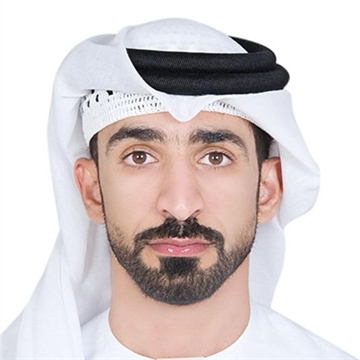 Official Spokesperson Programme - RUWAD Foundation to Support Pioneering Entrepreneurs
Official Spokesperson Programme - RUWAD Foundation to Support Pioneering Entrepreneurs
|
|
09:30
–
10:10
|
Discussion Session: Changing the Narrative - Empowering Refugees as a Path to Breaking Stereotypes
Refugees are often viewed through a lens of vulnerability and dependency, overshadowing their immense potential and the positive impact they can have on host communities. This session seeks to challenge and change these perceptions by highlighting the extraordinary potential of refugees. Given the right opportunities, refugees can make positive contributions to their host communities, breaking negative stereotypes and becoming beacons of hope and resilience.
Between inspiring stories and United Nations High Commissioner for Refugees (UNHCR) initiatives, the session seeks to conceptualise refugee empowerment and change misconceptions, through advocacy and programs implemented on the ground.
UNHCR’s interventions in empowering displaced people globally are supported vitally by the ongoing efforts of private sector actors. The session will highlight various ways of empowering displaced people, mainly through providing shelter and education and using media to shape the narrative.
The discussion also addresses the challenges and obstacles facing refugees, stories of hope and resilience, and the role of UNHCR, the private sector, and the media in breaking stereotypes associated with refugees.
Focusses:
- Highlighting the global situation of forced displacement and UNHCR’s main support sectors.
- Ways of spotlighting the challenges that shape the reality of refugees in host countries.
- Reviewing UNHCR’s interventions in the field and advocacy efforts to empower displaced persons.
- Presenting a story of hope from UNHCR’s Goodwill Ambassador Maya Ghazal, a Syrian refugee who went on to realise her dream of becoming a pilot.
- The role of the private sector in empowering displaced persons with initiatives to provide housing and education.
- The impact of media and influential figures on advocacy efforts.
Speakers:
-
Maya Ghazal
 Goodwill Ambassador for UNHCR and the world's first female Syrian refugee to become a qualified pilot
Goodwill Ambassador for UNHCR and the world's first female Syrian refugee to become a qualified pilot
-
Rosa Piro
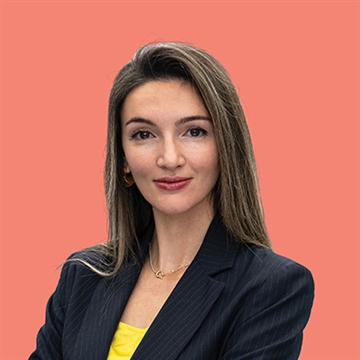 Director of Arada Foundation
Director of Arada Foundation
-
Latifa Al Qemzi
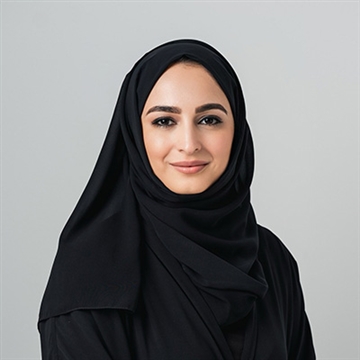 Director General of DP World Charity Foundation
Director General of DP World Charity Foundation
|
|
|
Moderator:
|
|
|
Organizer:
United Nations High Commissioner for Refugees (UNHCR)
|
|
10:10
–
10:50
|
Session: The Brand Journey Towards the Triangle of Leadership, Communication and Success
Why is the brand-building journey important for entrepreneurs and a distinctive stage in their success stories? Because it embodies a long-term partnership between entrepreneurs and their clients or customers.
It is a story built through the trilogy of innovation, challenge, and success, and is based in its various stages on verbal and visual communication to define the self and goals and build an identity that is a pillar for interacting with customers and sustainable marketing of the brand.
In this session, we travel on multiple journeys with distinguished achievers who have excelled in their fields and left an impact on the world of entrepreneurship. Through discussions with them, we learn about the power of communication and marketing in achieving the splendour of success.
Abdulaziz Al Kindi, the man behind the ‘Departure’ perfume brand, shares with us moments of inspiration and how he came to create a perfume for each destination he travelled to.
Yara Bin Shukr tells the story of overcoming the challenges of promoting sustainable fashion. Azra takes us through her road to success as a chiropractor and popularity on social media platforms as a henna design artist.
Author and university lecturer Omar Al Busaidi tells us about his journey of writing self-help books for startups and his strategies in effective communication to teach entrepreneurship and leadership.
Focusses:
- How did the idea of creating the brand begin?
- What stories and events shaped the brand identity?
- What are the effective strategies for reaching the target audience?
- How is social media used to enhance the brand?
- What are the biggest challenges they have faced, and how did they overcome them?
- How are sustainability principles integrated into their businesses and projects?
- What efforts are being made to achieve a positive impact on the community?
Speakers:
|
|
|
Moderator:
|
|
|
Organizer:
Sharjah Entrepreneurship Center (Sheraa)
|
|
10:50
–
11:30
|
Session: Future Skills in the Era of AI and Innovative Communication
The increasing reliance on smart technologies has transformed the ways we communicate and acquire information. The field of artificial intelligence has also brought about significant developments in skills crucial to the world of communication, necessitating the adoption of innovative and future-oriented communication skills. When we talk about these skills, we focus on those that enable individuals to thrive in the future world of work, amidst the dominance of artificial intelligence. These skills help humans move beyond anxiety about competing with machines to areas where human distinction excels, such as creativity, empathy, critical thinking, continuous learning, and adaptation.
This session addresses the significant transformations occurring in the labor market due to the rapid advancements in AI technologies and innovative communication. The focus will be on the new skills required to keep pace with these changes and how to prepare the workforce to handle the evolving future of work.
Focusses:
- How to gain future-proof technical skills such as data analysis, machine learning, software development, and cybersecurity.
- Modern workplace essentials in the age of artificial intelligence include both personal and professional skills such as critical thinking, creativity, collaboration, and emotional intelligence.
- The importance of lifelong learning and how to encourage individuals to continuously develop their skills to keep pace with technological advancements.
- The role of universities and training centers in preparing the workforce for the future job market requirements by updating curricula and providing specialized training programs.
- The use of innovative communication technologies, such as virtual reality and augmented reality, to enhance communication and collaboration within organizations.
- The challenges that the workforce and institutions may face in adopting these technologies and skills, as well as the opportunities they provide for achieving sustainable growth and development.
- Practical examples and models of companies and institutions that have successfully implemented AI technologies and innovative communication, and prepared their employees with future skills.
Speakers:
-
Dr. Yousif El-Ghalayini
 Associate Professor of Public Administration at the Mohammed Bin Rashid School of Government, Coordinator of the Executive Master of Public Administration program, and a Fellow at the Centre for Governance Studies at the University of Ottawa, Canada.
Associate Professor of Public Administration at the Mohammed Bin Rashid School of Government, Coordinator of the Executive Master of Public Administration program, and a Fellow at the Centre for Governance Studies at the University of Ottawa, Canada.
-
Dr. Amal Sultan Al-Halyan
 Emirati expert with extensive experience in government media sector.
Emirati expert with extensive experience in government media sector.
-
Malik Al-Madani
 Executive Director of Government Performance at the Prime Minister's Office, UAE
Executive Director of Government Performance at the Prime Minister's Office, UAE
|
|
|
Moderator:
|
|
|
Organizer:
Mohammed bin Rashid School of Government (MBRSG)
|
|
11:30
–
12:10
|
Session: Setting Guardrails for an AI Enables World
The rapid development of artificial intelligence technologies poses new challenges, highlighting the importance of developing and formulating clear and comprehensive regulatory frameworks for this field. These frameworks should not be limited to the technical aspect alone but also encompass ethical, legal, and social dimensions.
The session addresses the importance of establishing regulatory and ethical frameworks to guide the use of artificial intelligence in various fields. As reliance on AI technologies increases, it becomes essential to ensure their responsible and safe use by setting clear and effective rules that regulate how these technologies are developed and utilised.
Focusses:
- Discuss the need to regulate the use of artificial intelligence and the potential risks of unregulated use of these technologies.
- Identify the ethical principles that should guide the development and use of AI technologies: case studies on the impacts of AI on society and individuals.
- Address current policies and laws related to AI and the need to update legal frameworks to keep pace with technological advancements.
- The importance of protecting personal data in the context of AI applications.
- The necessity of achieving transparency in AI development and usage processes.
- The importance of international cooperation to develop unified regulatory frameworks.
- The technical and legal challenges in setting and implementing regulatory frameworks and how to overcome them.
- Future trends in regulating AI use and how to balance innovation with regulation.
Speakers:
-
Prof Immanuel Azaad Moonesar R. D
 President of Academy of International Business (MENA) and Health Policy and Systems Research Professor at Mohammed bin Rashid School of Government
President of Academy of International Business (MENA) and Health Policy and Systems Research Professor at Mohammed bin Rashid School of Government
-
Dr. Khulood AL Sayegh
 IEEE Certified AI Ethics Consultant and Regulatory Advisor, Leading Healthcare Leader.
IEEE Certified AI Ethics Consultant and Regulatory Advisor, Leading Healthcare Leader.
|
|
|
Moderator:
|
|
|
Organizer:
Mohammed bin Rashid School of Government (MBRSG)
|
|
12:10
–
12:50
|
Workshop: Government Institutions x Creative Incubators: Who Attracts Youth?
In light of the rapid development in the media and communication sector, along with the proliferation of media messaging channels, governments must view emerging talent in this field with a different perspective and higher standards. This change directly impacts the identity and voice of institutions in society’s eyes. It is what the recipient uses to assess the institution’s competence and build trust in it as a platform for providing services.
Governments with a forward-thinking mindset recognise the importance of exploring individuals’ hidden talents and skills and investing in them to deliver proactive, integrated services that enhance the performance of government institutions. During this workshop, participants will engage in discussions to uncover the spark that motivates individuals to be part of an institution's media and communication team. Do young people possess the right whys and wherefores to enter this world?
Focusses:
- Why do emerging talents choose the media and communication sector as a launching pad for their careers?
- Are youth aware of the importance of continuous learning in the media and communication sectors? How well do academic syllabi align with the creative field?
- Do government institutions provide supportive opportunities for youth to adopt future skills in the creative field?
- How essential are innovative tools in a rapidly evolving environment?
- What is the youth’s perspective on the career opportunities offered by government institutions in the media and communication sector?
- Does the youth’s vision for their future extend beyond institutional work in the creative field?
Speakers:
-
Mira Abdelrahman Alhammadi
 Director Corporate Communication, The Executive Office of Her Highness Sheikha Jawaher Al Qasimi
Director Corporate Communication, The Executive Office of Her Highness Sheikha Jawaher Al Qasimi
-
Asma Hassouni
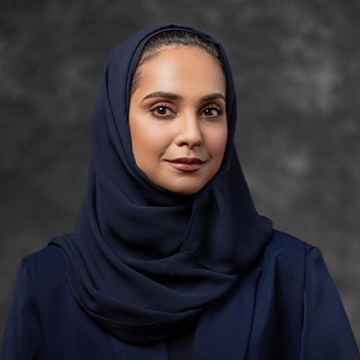 Director of Media Office, The Supreme Council for Family Affairs, Sharjah
Director of Media Office, The Supreme Council for Family Affairs, Sharjah
|
|
|
Organizer:
The Executive Office of Her Highness Sheikha Jawaher Bint Mohammed Al Qasimi
|
|
12:50
–
13:30
|
Session: Digital government communication - between empowering and benefiting from the youth
Digital government communication plays a vital role in empowering youth and encouraging them to participate effectively in building their communities.
Providing information and services and facilitating communication has helped youth make informed decisions that build their professional future and empower them economically by creating new employment opportunities that stimulate growth and contribute significantly to sustainable development.
Benefiting from youth skills in technology and social media has led to efforts for partnership between government agencies and youth in enhancing government communication processes. This has led to the dissemination of government messaging in innovative and engaging ways. It also encourages the community participation of youth in decision-making and enhances trust between governments and communities, building bridges of communication to achieve development goals.
However, with the development of digital communication, these partnerships and efforts necessitate continuous development and a conducive environment for attracting young energies.
Focusses:
- The most important government initiatives to enhance communication between the government and youth
- The foundations for enhancing the role of youth in digital government communication
- Effective government communication methods for various age groups
- The impact of youth on the development of digital government communication mechanisms
Speakers:
-
Khaled Al Nuaimi
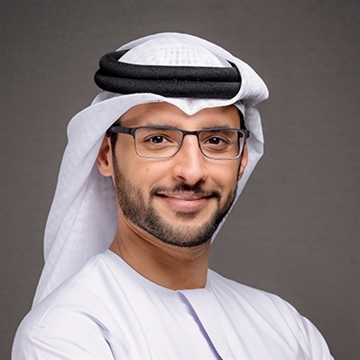 Director of the Federal Youth Foundation
Director of the Federal Youth Foundation
-
Asma Hassouni
 Director of Media Office, The Supreme Council for Family Affairs, Sharjah
Director of Media Office, The Supreme Council for Family Affairs, Sharjah
|
|
|
Moderator:
|
|
|
Organizer:
|
|
13:30
–
14:40
|
Session: Meeting Across Generations…Transferring Treasures of Knowledge and Experiences
Intergenerational meetings are not just passing gatherings or routine communication, but rather a valuable opportunity to invest in the future and build a more cohesive and understanding society, passing down cultural heritage from one generation to another.
While the elderly are repositories of knowledge and experiences, who contribute to preserving a nation’s or society’s cultural identity, the current generation works as the bridge between generations and enhances mutual respect and understanding.
Through its “Meeting Across Generations” initiative, the UAE Ministry of Community Development seeks to enhance effective communication between generations, to transfer cultural heritage from grandparents to children and grandchildren, besides helping the elderly to keep pace with the latest developments. This contributes to the mental well-being of individuals of all ages, engendering a sense of belonging and purpose in life.
Besides, interaction between individuals of different ages expands individual horizons and the ability to acquire skills and deal with challenges.
At the International Government Communication Forum 2024, young people will benefit from the rich experiences of the elderly. Members of the new generation will also freely speak their mind and discuss with their seniors the following topics:
Focusses:
- The role of the cultural economy as a vital element in the life of the family and society.
- The importance of intergenerational cooperation to enhance innovation and achieve sustainable development.
- The role of education in enhancing communication between different ages and grooming future generations.
- Methods to acquire economic skills appropriate for the modern era.
- How to invest in human capital of different ages to enhance innovation and economic growth.
- Ways for different generations to keep pace with challenges by employing effective government communication.
Speakers:
|
|
|
Moderator:
|
|
|
Organizer:
The Ministry of Community Development
|
|
14:40
–
15:00
|
Dialogue Session: Ahmed Al Ghfeli…Invincible Influencer
Ahmed Al Ghfeli is a versatile Emirati media professional, poet, and influencer. His disability did not prove a stumbling block in his ambitions to scale the heights of success in the media industry. Ahmed Al Ghfeli is today considered the first Emirati content creator with a disability.
Even though he was born without sight, he cultivated the ability to see people and the world through his heart, responding to the world around him. He worked hard to develop himself into a distinguished media professional and influencer known for his content creation and presentation.
Ahmed overcame formidable challenges to achieve success. Pursuing the path of science and knowledge, he obtained a bachelor's degree in mass communication (2014), as well as a professional diploma in parliamentary work from the University of Sharjah. He is also a certified trainer and advocate for the rights of people of determination.
A professional institutional excellence practitioner in the 4G system (2018), he also holds a diploma in future services from the UAE Ministry of Interior (2023).
Focusses:
- Ahmed's experience in radio, television, and content creation and the contradictions between his various roles.
- Challenges faced by people of determination in content creation and strategies to overcome them.
- How people of determination can benefit from artificial intelligence in content creation.
- The role of content creation in raising community awareness of the skills and potential of people with disabilities.
Speaker:
|
|
|
Organizer:
The Ministry of Community Development, UAE
|
|
|
|
|
10:30
–
12:30
|
Training program: Management and preparation of television programmes
The training programs aim to provide participants with the skills of managing and preparing television programs in various stages, starting from how to prepare the idea and topics of the interview to the final presentation before the viewers.
The host will discuss the factors vital for the success of television programs in their various forms, and the art of successful media interviews.
Trainer:
-
Ahmed Fayek
 Head of the Program section at the United Media Services Company and Editor of ‘Her Excellency’ Program.
Head of the Program section at the United Media Services Company and Editor of ‘Her Excellency’ Program.
|
|
12:40
–
14:40
|
Training program: Successful radio presentation skills
The training program aims to provide participants with skills of presentation for radio in its various formats, both for traditional radio and digital platforms.
It will discuss the factors necessary for successful radio programs including conducting radio interviews, talk shows, and how to adapt, modulate, and refine your voice for the radio. Additionally, participants will learn ways to attract the audience by presenting content in an engaging manner.
Trainer:
|
|
|
|
|
10:00
–
11:30
|
Workshop: Safety Ring by Strengthening Communication Channels
The Sharjah Prevention and Safety Authority has a pioneering role in effective and flexible communication methods, as it enhances its communication with the general public by opening new communication channels that allow everyone the opportunity to communicate with the Authority to benefit from the services provided to them.
The Government Communication Department seeks to introduce its activities and services to external stakeholders using the latest and smart technologies allowing them to benefit from them through traditional and modern communication platforms and channels.
The workshop discusses the foundations and strategies of direct and indirect communication and the emotional communication methods the Authority follows in its multi-dimensional and continuous interaction with the public. It thus contributes to developing visions for the future of communication in agile governments.
Focuses:
- The Authority's modern communication channels and dissemination of information
- Methods of interaction between the Authority and the public
- The foundations and strategies of the Authority's communication
- Employing emotional communication in the Authority's dealings with the public and broadcasting messages
Trainer:
|
|
14:00
–
15:30
|
Workshop: Communication Mechanisms for Reporting Safety Incidents
The Sharjah Prevention and Safety Authority (SPSA) adopts innovative methods to communicate with the public and customers even in times of crisis. The Authority has adopted an electronic program that helps employers to register their facilities and keep track of their classification through it.
The program offers mechanisms for reporting accidents and sending periodic reports of occupational safety and health data to the Authority, besides providing a mechanism for reporting potentially hazardous cases.
The program also includes a mechanism for monitoring non-compliance notes and the status of their removal, which helps in accelerating and computerising procedures in line with the directives in force in the Emirate of Sharjah, which are specific to facilitating employers' procedures and creating a positive investment climate in the emirate.
The service allows occupational health and safety officials to report accidents in various workplaces, through easy and quick steps, without the need to go to the SPSA headquarters.
Focuses:
- The role of the program in enhancing constructive communication between the Authority and the public.
- The role of the program in improving communication with the Authority in times of crisis.
- The importance of the program in encouraging and stimulating investment in Sharjah.
Trainer:
|